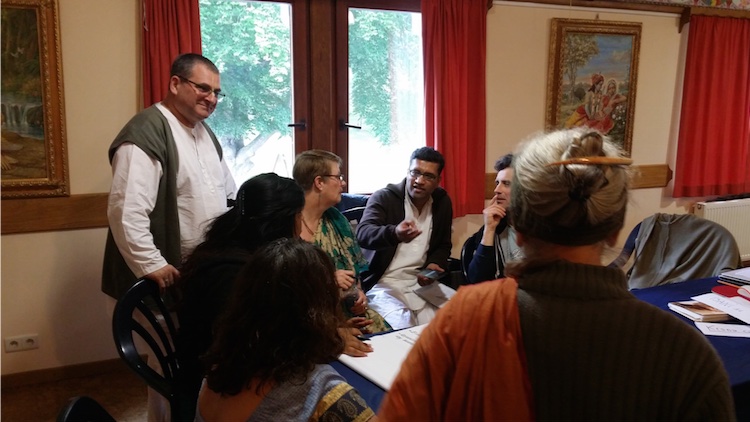ISKCON Europe Communications Seminar, Radhadesh, Belgium
By Kumari Kunti Sherreitt | Июн 29, 2015

First Visit by Anti-Cult Members to ISKCON
“Theology and freedom of choice is more important then ever before”, said the ISCA (International Cultic Studies Association) member (who asked to be anonymous for this article) in front of a room of ISKCON Communication team members from all over Europe.
It was the first time Anti-Cult members have visited an ISKCON temple and did a presentation. It was held during Radhadesh’s hosting of the ISKCON Europe Communications conference.
ISKCON is no stranger to the organisation. Over the years Anuttama Das, ISKCON Global Communications Director, has built a relationship with the organisation by attending conferences and speaking openly about ISKCON’s issues.
“It is because we have built up trust with Anuttama over the years,” they said, “that allows us to open up this dialogue”, said one of the speakers.
Although ISKCON used to be considered a “cult” in many parts of the world, as Anuttama Das’, “History of ISKCON” presentation showcased, ISKCON has rebuilt its reputation and created relationships with its once opposition.

The group of devotees visit the Maredsous Abbey
“To its credit, ISKCON has dealt with its issues well,” they said, “publishing in ISKCON Studies Journal about its dirty laundry”, they defended, hinting that this is one of the reasons that he is open to dialogue with ISKCON.
Dissent, they said, is a large issue and a way of judging the “cultness” of an org, explained the ISCA member. ISKCON, they mentioned, has been in formal dialogue with ex-ISKCON members over the years, showing signs of its maturity and openness.
ICSA’s mission includes helping former members of cults, educating the public about psychological manipulation, and conducting research about cultic and high-control organisations. It’s membership and board is comprised of professors and professionals in a variety of fields and has been around since 1979.
The rest of the conference events were further enlightening, including a visit to the Maredsous abbey, the largest mosque in Belgium, and a Cathedral in Brussels. Leaders at each of these institutions hosted and led the Communications members around and their many answered questions.

Group photo at Belgium’s largest mosque
Further discussions on issues and topics for Communication teams, including ISKCON’s 50th Anniversary celebrations were held in the remaining days. Advice, team building and strategic planning was done for the 50th Anniversary specifically.
After a long day of visiting different interfaith sites, the group made its way to Brussels city center by harinam where they took to the streets, chanting the maha mantra and moving onwards from the old town to the new town and back again. Many enjoyed a snack on the way back from the harinam to the bus, and they made their way to Radhadesh by late evening.
* * *
Why Dialogue with “Cult-Critics”
by Anuttama Dasa, ISKCON Minister of Communications
My thanks to Kumari Kunti Sherreitt for her recent ISKCON News article about the ISKCON Communications Conference in Radhadesh, Belgium.
As a principle organizer of this event she writes about, I’d like to point out an important aspect of ISKCON’s interaction with anti-cult organizations, or cult-watching organizations. The goal of such dialogue is not to ascertain whether ISKCON is, or is not, a “cult.” People are free to argue that point as they like, some referring to the historical legitimacy of Gaudiya Vaishnavism to state that ISKCON is an authentic religious tradition, others will point to the problems, past and perhaps present within our society, to claim ISKCON is a secte, or cult.
The real issue, and the reason we dialogue with cult-watching organizations is to understand the dynamics of what are today known as “cultic behaviors” including undue influence over people, lack of accountability of leaders, lack of transparency, manipulation, and psychological abuse. These are conditions that can exist in any group, or community of people across human society–including families, religious communities, political organizations, etc.
ISKCON and its membership have suffered from these social problems in the past in some parts of the world, and likely some of those harmful behaviors are still present in some places, to some degree in and around ISKCON. The key to continued progress and growth of ISKCON in this context, and the reason for dialogue with cult-watching groups, is to develop a deeper understanding of the nature of those potential problems and how they undermine the “purity” of our movement, the ethical behavior of our society, as well as healthy leadership and interpersonal dynamics within ISKCON.
And, of course, to learn and apply steps that can be taken to avoid the problems.
The purpose of meeting cult-watching experts is not to change in some shallow way the perception of our ISKCON society, especially among our critics. The purpose is ensure the ISKCON society is in fact, as best we can, promoting and abiding by healthy social, spiritually informed values and interpersonal relationships and structures.
If we do that individually and collectively, then the real goal will have been achieved. That is, our society will have minimized–and will continue to do its best to guard against–any and all forms of undue influence, mistreatment, and abusive leadership at all levels within our international community. To the degree that such healthy dynamics and leadership structures are the fact, and that we are prepared to dialogue about problems as well as progress, any negative perceptions and labeling of our society will naturally and automatically diminish.















